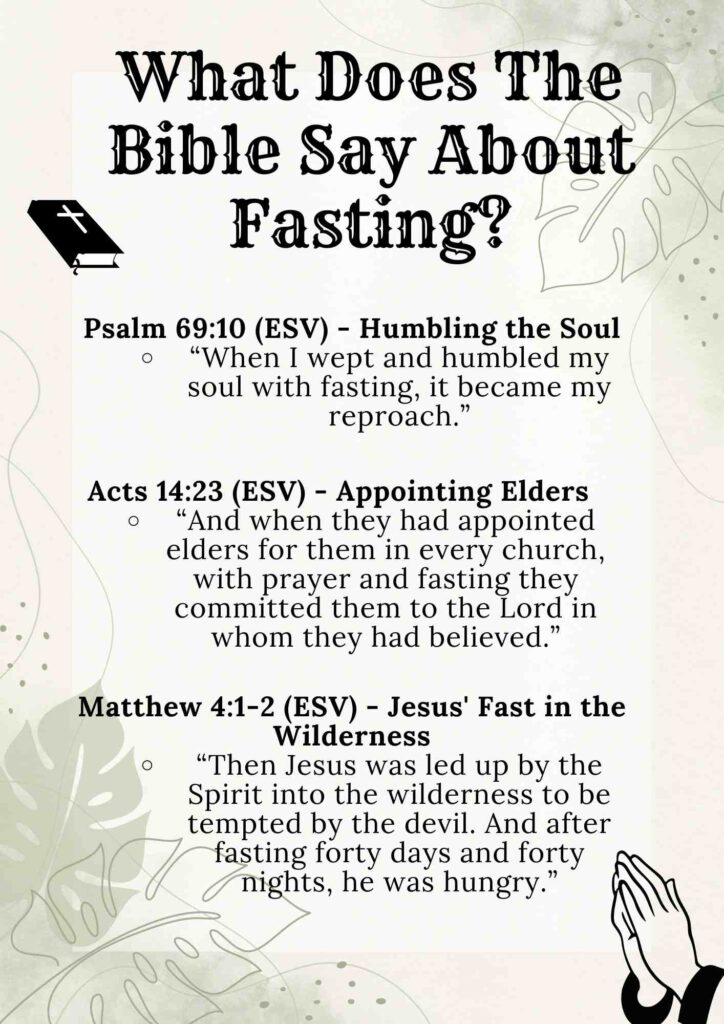Fasting in the Old Testament is presented as a significant spiritual practice with deep religious and communal implications. The Hebrew Bible describes fasting as a means of humbling oneself before God, seeking His favor, and demonstrating repentance. This section explores how fasting is depicted in the Law of Moses, highlights notable examples of fasting, and examines the purposes and outcomes associated with this practice.
Fasting in the Law of Moses
1. Day of Atonement (Leviticus 16:29-31)
The Day of Atonement, or Yom Kippur, is the most explicitly commanded fast in the Old Testament. Leviticus 16:29-31 instructs the Israelites to observe this solemn day by “afflicting their souls,” which is traditionally understood as fasting. This annual observance was a time for the entire nation to repent for their sins and seek God’s forgiveness. The fast served as a collective act of humility and contrition, reinforcing the community’s dependence on God’s mercy.
2. Examples of Corporate Fasting
The Old Testament also records several instances of corporate fasting beyond the Day of Atonement. These fasts were typically called in times of national crisis or when seeking divine intervention. For example, in Judges 20:26, the Israelites fasted after suffering defeat in battle, seeking God’s guidance and help. Similarly, in 1 Samuel 7:6, the people fasted at Mizpah, confessing their sins and turning back to God during a time of national repentance.
Notable Examples of Fasting
1. Moses’ 40-Day Fast (Exodus 34:28)
Moses’ fast of forty days and nights on Mount Sinai is one of the most significant fasting events in the Old Testament. During this period, Moses neither ate bread nor drank water as he received the Ten Commandments from God. This extraordinary fast highlighted Moses’ total dependence on God and his deep spiritual communion with Him. It was a time of divine revelation and covenant renewal for the Israelites.
2. David’s Fast for His Child (2 Samuel 12:16-23)
King David’s fast for his sick child, born of his affair with Bathsheba, illustrates fasting as an expression of intense personal grief and supplication. David fasted and lay on the ground, pleading with God to spare the child’s life. Although the child ultimately died, David’s fast demonstrated his deep remorse and his reliance on God’s sovereignty and mercy.
3. Esther’s Fast for Protection (Esther 4:16)
Queen Esther’s call for a three-day fast among the Jews of Susa is a powerful example of corporate fasting for deliverance. Faced with the threat of annihilation, Esther asked her people to fast and pray for God’s intervention before she approached the king to plead for their lives. This fast was a collective act of desperation and faith, seeking divine favor in a time of great peril.
4. Daniel’s Fasts (Daniel 9:3, 10:2-3)
The prophet Daniel is noted for his regular practice of fasting. In Daniel 9:3, he fasted and prayed earnestly, seeking understanding and confessing the sins of his people. Later, in Daniel 10:2-3, he fasted for three weeks, abstaining from rich food, meat, and wine, as he sought a vision and understanding of a troubling revelation. Daniel’s fasting was a means of deepening his spiritual insight and communion with God.
Purpose and Outcomes of Old Testament Fasts
Fasting in the Old Testament served multiple purposes and yielded various outcomes, including:
- Humility and Repentance: Fasting was a tangible expression of humility and repentance, a way to demonstrate one’s sorrow for sin and earnestness in seeking God’s forgiveness (Joel 2:12-15).
- Seeking Divine Guidance: Fasting often accompanied prayer when seeking God’s guidance or intervention in critical situations (2 Chronicles 20:3-4).
- Spiritual Preparation: Individuals fasted to prepare for receiving divine revelation or undertaking significant spiritual missions (Exodus 34:28, Daniel 10:2-3).
- National Intercession: Corporate fasting was a means of uniting the community in intercession and supplication during times of national distress (1 Samuel 7:6, Esther 4:16).
The outcomes of these fasts varied, but they consistently reflected a deepening of the individual’s or community’s relationship with God. Whether seeking forgiveness, guidance, or deliverance, fasting was a profound act of faith and dependence on the divine.
New Testament Perspectives on Fasting
In the New Testament, fasting continues to be a significant spiritual discipline, evolving from its Old Testament roots while maintaining its core purpose of deepening one’s relationship with God. This section explores Jesus’ teachings on fasting, its practice in the early church, and the differences and continuities between Old and New Testament fasting practices.
Jesus’ Teaching on Fasting
Jesus’ approach to fasting highlights its spiritual significance and the proper attitude one should have while fasting. He emphasized the importance of sincerity and humility over outward displays of piety.
1. Sermon on the Mount (Matthew 6:16-18)
In the Sermon on the Mount, Jesus provides explicit instructions on fasting. He advises His followers not to fast like the hypocrites who seek public admiration for their piety. Instead, Jesus teaches that fasting should be a private matter between the individual and God. He says, “But when you fast, put oil on your head and wash your face, so that it will not be obvious to others that you are fasting, but only to your Father, who is unseen; and your Father, who sees what is done in secret, will reward you” (Matthew 6:17-18). This passage underscores the importance of genuine devotion over outward appearance.
2. Jesus’ 40-Day Fast (Matthew 4:1-11)
Before beginning His public ministry, Jesus fasted for 40 days and nights in the wilderness. This period of fasting was a time of intense spiritual preparation and testing. During this time, Jesus was tempted by the devil, but He remained steadfast, relying on God’s word for strength. This fast not only demonstrates Jesus’ dependence on God but also sets an example of resisting temptation through spiritual discipline and reliance on Scripture.
Fasting in the Early Church
The early church adopted and adapted the practice of fasting, integrating it into their communal and spiritual lives. Fasting was seen as an essential part of seeking God’s guidance and strengthening spiritual leadership.
1. Church Leadership and Fasting (Acts 13:2-3, 14:23)
Fasting was a common practice among early Christian leaders. In Acts 13:2-3, the church at Antioch fasted and prayed before the Holy Spirit directed them to set apart Barnabas and Saul (Paul) for missionary work. Similarly, in Acts 14:23, Paul and Barnabas appointed elders in the churches they founded, fasting and praying for God’s guidance in their selections. These instances highlight fasting as a means of seeking divine direction and ensuring that decisions were aligned with God’s will.
2. Paul’s Teachings and Practices (2 Corinthians 6:5, 11:27)
The Apostle Paul frequently mentioned fasting in his letters, indicating its importance in his ministry. In 2 Corinthians 6:5, he lists fasting among the hardships he endured for the sake of the Gospel. In 2 Corinthians 11:27, Paul recounts his many experiences of fasting, illustrating his commitment to spiritual discipline and dependence on God in all circumstances. Paul’s writings reflect a view of fasting as both a personal spiritual practice and a means of enduring and overcoming trials.
Differences and Continuities with Old Testament Practices
While the New Testament retains many aspects of Old Testament fasting, there are notable differences and continuities.
Continuities:
- Spiritual Purpose: In both the Old and New Testaments, fasting is a means of humbling oneself, seeking God’s guidance, and expressing repentance.
- Communal and Personal Fasting: Both testaments include examples of individual and communal fasting for various spiritual purposes.
- Connection to Prayer: Fasting is often paired with prayer, highlighting its role in seeking a deeper connection with God.
Differences:
- Emphasis on Secrecy: Jesus’ teaching in the New Testament places a stronger emphasis on the private nature of fasting, contrasting with some Old Testament practices that were more communal and public.
- Christocentric Focus: New Testament fasting is centered on Christ and His teachings. For instance, Jesus’ own fast and His instructions to His followers provide a model for Christian fasting.
- Expanded Context: The early church used fasting as a way to seek guidance for church leadership and missionary work, reflecting the expanding mission of the church in the New Testament era.
In conclusion, the New Testament builds upon the Old Testament foundations of fasting, emphasizing sincerity, humility, and a Christ-centered approach. Fasting remains a vital practice for spiritual growth, seeking divine guidance, and expressing repentance, adapted to the context of the early Christian community and its mission.
The Spiritual Significance of Fasting


